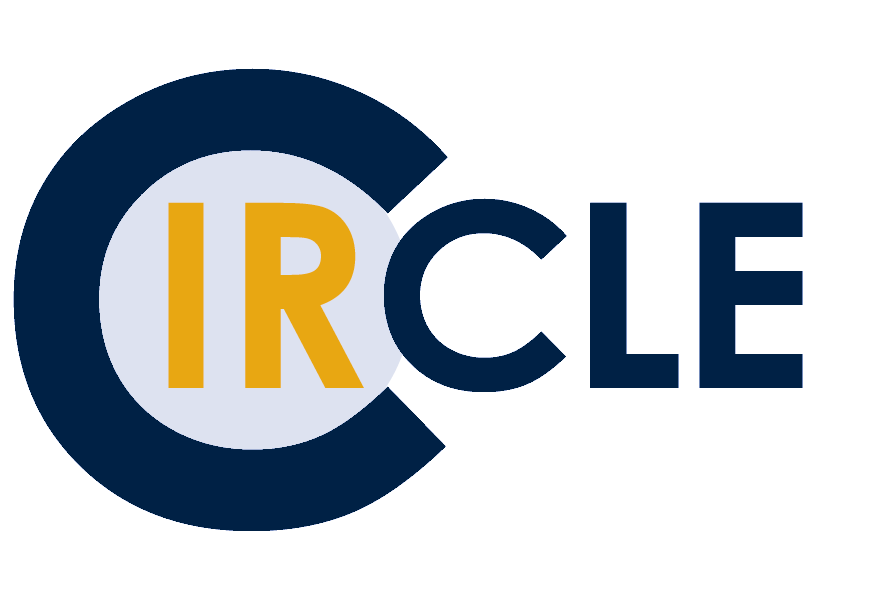 Photo courtesy: UBC Brand and Marketing
Photo courtesy: UBC Brand and Marketing
My time as cIRcle’s Research Assistant (RA) started this past September, as I began my second year in UBC’s Master of Library and Information Studies program. I had learned the theory behind scholarly communications but had no real-world experience working with academic resources. As the months went by working at cIRcle, I was slowly given the building blocks to better understand institutional repositories and their role in the university ecosystem, including learning more about different open access initiatives, Creative Commons licensing, metadata standards, and much more.
Submissions and metadata
One of the cIRcle RA’s primary responsibilities is supporting mediated deposit submission workflows, where the author supplies the content and the permission, and cIRcle supports and deposits the items on the author’s behalf. When I started this job, the first task I learned was how to properly create new digital records, including preparing files and applying metadata. This involved learning which collection a resource should belong to, who was involved in creating the resource, what type of resource it was, which file format it used, and so on.
As I grew more confident in the submission process, I was also taught how to find out what publishers allow authors to do with their publications. This process involves searching for information regarding a journal’s self-archiving and open access policies, including whether an article’s accepted manuscript can be archived within an institutional repository and whether there are any embargos that need to be applied. With submission and publisher permission practice under my belt, I could start my next responsibility: content outreach and recruitment.
Content Outreach and Recruitment
I had the pleasure of working on two outreach and recruitment campaigns over my time at cIRcle.
The first was cIRcle’s ongoing recruitment of research articles authored by the UBC faculty supervisors of recent theses and dissertations deposited to the repository. This project involved all of the steps necessary to complete a submission, from finding a publication to creating the item record. I searched for UBC faculty members who had authored research articles that were not openly available and reached out to them. I then asked if they would be interested in submitting their work to cIRcle, highlighting the advantages of putting their work into an institutional repository, such as increased visibility of their research and fulfillment of any Tri-Agency open access grant requirements. Once they sent over the permitted version of their article and signed the cIRcle Non-Exclusive Distribution License, I created the record in DSpace. I then notified the author when their submission was available in cIRcle and provided them with the persistent URL for the item. From November 2024 to April 2025, I contacted 35 authors and was able to make approximately 15 articles openly available.
The other recruitment campaign I worked on was Paper Pledge for the Planet. This project involved contacting UBC authors of 20 climate change research articles published within the last five years. Through this project I successfully made seven articles publicly available, including research surrounding ocean acidification on marine parasites, and the impact of climate change on endangered conifer tree species. For more information on this campaign and ways to get involved, please read the cIRcle Paper Pledge for the Planet blog post.
Audits and Research
I worked on several audits over the year. The first came in the form of cIRcle’s DSpace Community and Collection Role Audit, where I helped build a spreadsheet and input current information about the DSpace communities and collections within cIRcle, including their assigned roles, groups, and members. Once the spreadsheet was complete, based on cIRcle’s recently developed guidelines, I made recommendations on whether roles, groups, and/or members should be added, maintained, or removed. I also recently wrapped up an audit of cIRcle’s Wiki. During this audit, I looked at the page formatting for each cIRcle webpage and made notes on which pages need to be updated with cIRcle’s most recent formatting procedures.
As the end of my appointment approached and I was feeling confident with numerous aspects of life at cIRcle, I was asked to write a report on file naming best practices in digital repositories, with the goal of making recommendations for cIRcle’s current File Naming Conventions. The report took information from a variety of sources, including file management guidelines from other universities, examples of file names from other Canadian institutional repositories, and advice from the UBC Data Bites File Naming Best Practices Workshop, amongst others. It reviewed a variety of file naming elements, including length, character usage, and spacing. It also explored other file considerations, such as file property metadata and differences between human and machine readability. By the end of my time at cIRcle, I created a report that was reviewed by my cIRcle colleagues and will help inform future discussions of current naming procedures and practices at cIRcle.
Communications
Finally, throughout the year, I regularly contributed to cIRcle’s blog. They ranged in a variety of content. However, they fell into two broad categories. The first was all about exploring and promoting different collections within cIRcle, and included a post on the multidisciplinary research done by students in Dr. Benjamin Y. Cheung’s ASIX 300A and ACAM 320B courses. The second theme I worked on involved exploring cIRcle through the lens of different yearly events. Some examples of this include my posts on International Holocaust Memorial Day and International Women’s Day.
Going forward
As seen above, my time at cIRcle has taught me a wide variety of skills. This position not only refined my knowledge on institutional repositories but also enhanced my professional abilities in project management, e-mail communication, and teamwork. Going forward, I am confident that I will apply the lessons I learned at cIRcle in a myriad of ways. I am truly grateful for my time at cIRcle and for the wonderful staff who helped make it such a rewarding experience.
